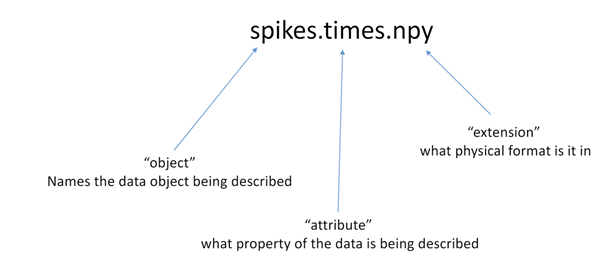The Open Neurophysiology Environment (ONE) is a simple way to standardize and share data with other scientists.
| ONE documentation in PDF format | Suggested filename list |
ONE is not a file format, it is a filename convention. It formalizes file naming rules like those scientists already use to organize data within a lab. Using this standard can help keep data organized within a lab, and also makes sharing straightforward, since other scientists can easily tell what is in your files and how to read them.
Data for each experiment is stored in a set of files stored in a directory. Each file has a 3-part name. The first two parts define what the file contains, the third its physical format. For example, spikes.times.npy contains spike times, saved as an npy file (a simple format for binary arrays).
Files with the same first name part encode attributes of the same objects. Thus, spikes.clusters.npy contains the cluster assignments of the spikes whose times are in spikes.times.npy.
When one file’s 2nd name part matches another file’s 1st this encodes a cross-reference. For example, each row of spikes.clusters.npy points to a row of clusters.amps.npy, which contain information on the corresponding clusters.
Common data types like spike times and cluster assignments have standard file names (listed here), so users can know what's in your riles without reading documentation. For data specific to your project you can choose any filenames, provided they start with _ and follow the above conventions.
That’s basically it! There are a few more conventions, described in the pdf documentation. To share ONE-compliant data, just upload your files to a website. Users can download and read your files directly, or use an API to search and load. For big projects, the API lets users search large datasets hosted on a remote server and download only the data they need. Because the data are stored in many small files rather than one big HDF5, downloads are quicker and transparent to the user.
For compatibility with NWB there’s a format converter, written by Catalyst Neuro.
 Close
Close




